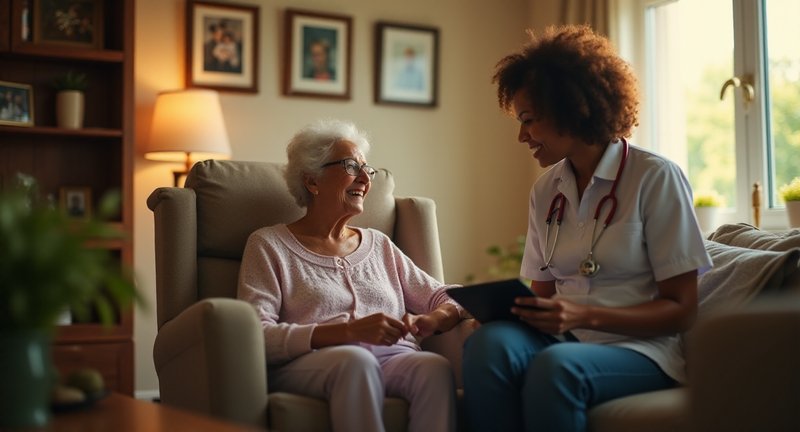The Basics of Silver Lining Home Care
When I first encountered the concept of ‘Silver Lining Home Care,’ I was captivated by the idea of transforming ordinary home care into something extraordinary. It’s about finding joy in every detail of providing support and comfort to those in need.
Imagine walking into a home where warmth and kindness resonate in the air. That’s what Radiant home care solutions strives for creating a nurturing environment that feels like a hug. It’s not just about assistance; it’s about companionship, offering a sense of belonging.
In my experience, the emphasis on personalized care sets Bright horizon care services apart. Each client is treated like family, ensuring that their unique preferences and needs are at the forefront. It’s this thoughtful approach that can turn a simple visit into a cherished moment.

Have you ever noticed how the little things can make a big difference? With Shining comfort home assistance, a favorite book read aloud or a stroll through the garden can brighten someone’s day. These moments, although seemingly small, ripple out to create profound impacts.
The beauty of Luminous supportive care lies in its commitment to holistic well-being. This means not only focusing on physical health but also prioritizing emotional and social connections. In a world where loneliness can sometimes feel overwhelming, this care model provides a beacon of hope.
If you’re exploring home care options, I encourage you to consider the heart and soul behind services like Gleaming haven home services. After all, we all deserve a silver lining in our daily lives.
The Benefits of Silver Lining Home Care
In relation to in-home care, the advantages can truly make all the difference not just for the person receiving the care, but for their entire support network. Over the years, I’ve seen how having a trusted care provider step in can change the dynamic of a family for the better. It’s more than just medical attention; it’s about fostering peace of mind and nurturing well-being right where it matters most at home.
One of the greatest benefits is the personalized touch. Unlike a one-size-fits-all approach, home care is tailored to the specific needs of the individual. Whether it’s assisting with daily tasks like meal preparation or simply being there for companionship, the care is customized and evolves over time as circumstances change.

Let me break it down further:
- Comfort of Familiar Surroundings: There’s something to be said about healing or aging in a place you’ve called home. The power of a familiar setting can have profound effects on both mental and emotional health.
- Flexibility in Care Options: Whether short-term after surgery or long-term due to chronic conditions, home care adapts. There’s no rigid schedule; it’s designed to fit life’s ebb and flow.
- Family Involvement: Families can still remain actively involved in the care process, without feeling overwhelmed. It creates a collaborative environment where everyone feels supported.
- Cost Efficiency: Believe it or not, in-home care can often be more cost-effective than residential facilities. You get the care without the added overhead of housing and facility costs.
Also, in-home care ensures that no one feels like they’re losing independence. Instead, it provides the balance of support and freedom, making sure life stays as fulfilling as ever.
Understanding Home Care Services
When you think about home care services, it’s more than just helping someone with their daily routine. It’s about ensuring people can stay in the comfort of their own home while receiving the care they need. I’ve seen how crucial this can be for families trying to balance providing support for their loved ones and managing their own busy lives.
Home care can take many forms, from medical assistance to simple companionship. Here’s a breakdown of what services might include:
- Personal Care: Help with daily activities like bathing, dressing, and grooming.
- Health Monitoring: Some services may involve regular checkups, medication management, or even therapy sessions.
- Household Help: This includes tasks like cleaning, cooking, and even grocery shopping to ease the everyday burden.
- Companionship: Providing social interaction is essential, especially for those who may feel isolated.
- Specialized Care: For people with specific conditions like Alzheimer’s, home care professionals offer tailored support to ensure safety and comfort.
What I find most compelling is the peace of mind it offers. You’re not just bringing in assistance; you’re giving your loved one the ability to maintain their dignity and independence in familiar surroundings. And as much as it’s a relief for families, it’s an absolute lifeline for those receiving the care.
Whether you’re planning for the future or dealing with an immediate need, exploring all the available options ensures the best fit. After all, it’s about finding the right balance between independence and support.
Why In-Home Care is Beneficial for Seniors
When dealing with senior care, there’s something profoundly comforting about staying in one’s own home. I’ve seen this firsthand, and believe me, it can make a world of difference. In-home care isn’t just about convenience it’s about preserving dignity, independence, and that all-important feeling of being in a familiar space.
Let’s be real, no one wants to leave their home if they don’t have to. For seniors, this can be especially true. The memories, the personal touches, the routine it all adds up to a sense of security that a new environment just can’t provide.
Here are a few reasons why in-home care works so well for seniors:
-
Maintaining Independence: They can continue with daily routines, no matter how small, like making their morning coffee or tending to their garden. These small tasks are often the things that keep a person feeling capable.
-
Personalized Care: Unlike in larger facilities, where staff might be spread thin, in-home care means undivided attention. Caregivers can cater specifically to the senior’s preferences and needs, from diet to daily activities.
-
Comfort of Familiarity: Let’s face it there’s no place like home. The environment is familiar, the bed is theirs, and the view from the window is the one they’ve looked at for years. This sense of belonging is irreplaceable.
-
Peace of Mind for Family: Knowing that their loved one is in a safe and familiar environment provides family members with peace of mind. And hey, there’s no racing across town for visiting hours drop in whenever!
In my experience, when a senior receives care in their own home, it’s like they’re not just being taken care of they’re continuing to live the life they’ve built, in the place that’s always been theirs.
Personalizing Care for Individual Needs
In my years working closely with clients, I’ve realized something profound: care isn’t a one-size-fits-all service. Each person has their own rhythm, their own needs, and what works for one may feel stifling or ineffective for another. When we talk about personalizing care, it’s about more than just ticking off tasks.
It starts with really listening. The kind of listening where you’re not just hearing, but tuning into the nuances the unspoken fears, the small preferences, the individual quirks that make someone feel truly seen. This isn’t the stuff you learn from a manual; it’s learned by paying close attention, with heart.
You see, in my experience, true personalized care means adapting on the fly. What’s comfortable today might not feel right tomorrow. It could be as simple as a change in routine or adjusting the little things that make someone feel at ease. That’s the beauty of human care its flexibility.
The trick lies in balancing professional insight with empathy. Yes, we have our expertise, but it’s not about applying cookie-cutter solutions. It’s about weaving that expertise into a care plan that feels organic to the person, like it was made for them all along. And when that happens? It’s magic.
Personalizing care goes beyond meeting physical needs it nurtures the spirit. I’ve seen firsthand how even the smallest gesture tailored to someone’s personality can transform their day, sometimes even their outlook on life. There’s something deeply fulfilling about being part of that.
The Role of Professional Caregivers in Your Loved One’s Life
The role of professional caregivers in the life of a loved one is nothing short of transformative. They become not just helpers, but beacons of light in a sometimes overwhelming sea of uncertainty.
From my experience, these caregivers often wear many hats. They juggle emotional support, daily tasks, and a sprinkle of companionship that makes all the difference.
Imagine someone stepping into your home, bringing warmth and understanding on a day when it feels like the world is heavy. That’s what a skilled caregiver does they breathe life into mundane routines, creating moments of joy where they are least expected.
I remember watching a caregiver play games with my family member, laughter echoing through the halls. It’s these small, precious instances that foster a connection beyond the tasks at hand.
Moreover, they help maintain a sense of dignity and independence for our loved ones. They tailor their approach to meet individual needs, ensuring that care feels personal and respectful, rather than just a checklist of chores.
As someone who has observed this dynamic, it’s clear that caregivers don’t just offer support; they offer a lifeline. They empower those they care for, reminding them that they are not alone on this journey.
In essence, professional caregivers enrich lives in countless ways. They are the steady hands and compassionate hearts that guide families through the ebbs and flows of life’s challenges.
Home Care vs. Assisted Living: Making the Right Choice
Choosing between home care and assisted living can feel like standing at a crossroads. From my experience, the decision hinges on more than just practicality there’s emotion, comfort, and quality of life wrapped up in it.
Home care offers familiarity. There’s a unique kind of comfort that comes from being in a space that holds your memories. I’ve seen people thrive simply by staying in the environment they’ve known for decades, surrounded by their personal touches and routines.
On the flip side, assisted living provides structure. It offers a community, which can be crucial when loneliness starts creeping in. For many, the social aspect alone tips the scale, offering new friendships and round-the-clock assistance that home care might struggle to match.
Of course, there’s a financial element, too. Home care can seem like the more affordable option at first glance, but costs can add up as needs increase. Assisted living is more predictable, often providing a package of services for a set fee, which can bring peace of mind.
At the end of the day, the right choice is deeply personal. I always recommend having an open conversation with loved ones, weighing the pros and cons with care. It’s not just about where you live, but how you want to live.
A Full Analysis of Silver Lining Home Care
When diving into the point of senior care services, I found myself particularly intrigued by Silver Lining Home Care. This organization epitomizes what compassionate caregiving should look like, seamlessly merging professionalism with a heartfelt approach. Here’s a closer look at what sets them apart:
Comprehensive Services
Golden horizon senior care offers a plethora of services designed to cater to diverse needs:
- Personal Care: From assistance with daily activities like bathing and dressing to companionship, they ensure comfort and dignity for their clients.
- Medication Management: Forgetting doses can be a common issue; their trained staff keeps everything on track.
- Specialized Care: They have options for Alzheimer’s and dementia care, adapting strategies to keep clients engaged and secure.
Unique Approach
What really caught my attention is their philosophy. They don’t just view care as a job; it’s a calling. The caregivers are selected not only for their skills but also for their emotional intelligence. This means they build genuine relationships with clients, creating an environment where seniors can thrive.
Testimonials That Shine
The feedback from families is overwhelmingly positive. They often mention the peace of mind that comes from knowing their loved ones are in such capable hands. In my experience, nothing beats hearing that a caregiver took the time to play a game or share a laugh.

In short, Radiant care solutions stands as a beacon of hope for families seeking reliable care solutions. Their commitment to blending compassion with expertise truly creates a silver lining in the often-cloudy world of senior care.
Enhancing Quality of Life Through Compassionate Care
Enhancing quality of life is not just about attending to physical needs; it’s about nurturing the emotional, social, and mental well-being of those in our care. From my own journey in compassionate caregiving, I’ve seen firsthand how simple acts of kindness can shift someone’s entire outlook.
It’s essential to recognize that caring for someone goes beyond the surface. Here are some key ways to enrich the lives of those we serve:
- Personalized Attention: Everyone has a story, a unique set of needs, and preferences. Tailoring care to individual routines, favorite activities, or cherished memories can make them feel seen and valued.
- Emotional Connection: Empathy is the heart of compassionate care. Spending time, listening actively, and genuinely engaging with those under our care can foster trust and comfort. It’s not just about tending to tasks; it’s about creating moments of joy and connection.
- Promoting Independence: Encouraging autonomy, even in small ways, empowers individuals and restores a sense of control over their lives. This could be as simple as allowing someone to choose their meal or help with light tasks.
- Mental Stimulation: Activities like puzzles, music, or storytelling are not just pastimes; they are lifelines that keep the mind active and spirits high. Keeping those we care for mentally engaged preserves dignity and joy.
- Family Involvement: In my experience, when families are involved in the caregiving process, it strengthens relationships and reassures everyone. Whether it’s weekly calls or attending family events, that sense of unity enhances overall well-being.
Through these actions, compassionate care becomes a bridge to a better, more fulfilling life. It’s not just about managing day-to-day tasks; it’s about creating a meaningful experience for all involved.
Services Tailored to Support Aging in Place
When dealing with creating a lifestyle that supports aging in place, I’ve seen firsthand how essential it is to provide specialized services that cater to individual needs. It’s not just about keeping people in their homes longer; it’s about enhancing their quality of life in a way that’s sustainable and dignified.
Here’s a look at how tailored services can make a world of difference:
-
Personalized Care Plans: No two people age the same way. That’s why custom care plans are so important. They account for everything from medical conditions to mobility challenges, ensuring that every need is covered. I always say it’s like crafting a life map where every turn is planned and supported.
-
Home Modifications: Aging in place often requires adjustments to the home. Whether it’s installing grab bars in the bathroom or widening doorways for wheelchair access, these changes can make the home safer and more comfortable. What I love about these modifications is that they blend function with freedom enabling people to move through their day with ease.
-
Companionship Services: Loneliness can be one of the most overlooked challenges for those aging in place. Having someone around for conversation, hobbies, or even a shared meal can boost emotional well-being. I’ve always believed that it’s not just about physical care emotional support plays a huge role in overall happiness.
-
Medical Coordination: Keeping track of appointments, medications, and health updates can be overwhelming. I’ve seen how crucial it is to have a coordinated system where healthcare providers, caregivers, and families are all in sync. It’s a game-changer in preventing complications and ensuring proper care.
Aging in place isn’t just about staying at home; it’s about thriving in it. With the right support, it becomes more than possible it becomes empowering.
Key Benefits of Hiring a Home Care Agency
When discussing finding care for a loved one, the decision can feel heavy. You want the best for them, and sometimes doing it all on your own isn’t the most practical or effective option. That’s where hiring a home care agency really steps in.
One of the standout benefits is the flexibility. These agencies can tailor services to fit the unique needs of your family. It’s like having a custom-fit care plan without the hassle of managing every detail yourself.
There’s also a level of trust that comes with professionals. I’ve seen the difference firsthand. Having someone trained, experienced, and compassionate in the home brings peace of mind that’s hard to replicate.
Consistency matters too. Agencies provide structured care, ensuring there’s no guessing when it comes to who is showing up or whether the right needs are being met. You don’t have to juggle schedules or worry about finding a last-minute replacement if something falls through.
Another hidden gem is the support for the family. Care agencies often help lighten the load by offering resources or simply being there as a buffer for those intense emotional moments. You don’t have to carry the entire burden on your shoulders.
And finally, safety. With a home care agency, you’re not just getting someone who can offer companionship but someone who understands the health aspects involved. I’ve seen how this transforms the experience from simple caregiving to truly comprehensive support.
Maintaining Independence with In-Home Assistance
Maintaining independence as we age is a delicate dance. In-home assistance can feel like a secret ally, allowing you to embrace your routines without surrendering your freedom.
I remember when my grandmother decided to invite help into her home. At first, she was hesitant, worried about losing her autonomy. But as she eased into this new arrangement, she found a rhythm that preserved her independence while providing a gentle nudge when needed.
Having someone around to assist with daily tasks can transform a daunting chore into a shared experience. Whether it’s meal preparation or light housekeeping, this support can lighten the load and keep your spirits buoyant.
The beauty of in-home assistance lies in its flexibility. You can tailor the services to match your unique needs, allowing for a customized approach that fits seamlessly into your life. It’s like choosing your own adventure, where you remain the author of your story.
I’ve seen firsthand how this arrangement can foster a sense of companionship. The presence of a caring individual not only offers practical help but also enriches daily interactions. A chat over coffee can make a world of difference.
So, if you’re contemplating this option, remember: it’s not about giving up control, but rather about enhancing your quality of life. Embrace the support and let it complement your independence.
Managing Health Conditions with At-Home Care
Managing health conditions from the comfort of your home can be a transformative experience, both physically and mentally. I’ve found that at-home care isn’t just about having a nurse or caregiver around; it’s about crafting an environment that fosters healing and empowerment. Here are some thoughts from my own journey into at-home care:
Creating a Healing Space:
- Comfort First: Invest in cozy furniture and soothing colors. A space that feels good can lift your spirits.
- Natural Light: Let the sunshine in! Natural light can boost your mood and promote a sense of well-being.
- Personal Touches: Surround yourself with things you love family photos, art, or books that inspire you.
Supportive Tools:
- Telehealth Services: Embrace virtual doctor visits. They save time and let you connect from your own cozy nook.
- Medication Management Apps: These handy tools can help keep your prescriptions organized, so you never miss a dose.
- Wellness Devices: Consider gadgets like fitness trackers or blood pressure monitors to keep an eye on your health metrics.
Engaging Activities:
- Stay Active: Gentle exercise routines like yoga or tai chi can be done at home. They help both the body and mind.
- Mindfulness Practices: Meditation or breathing exercises can ease anxiety and create a sense of peace.
- Connect Socially: Regular video chats with family and friends can provide emotional support and combat loneliness.
Remember, managing health at home is a personal journey. Tailor it to what feels right for you. It’s about creating a sanctuary where you can thrive, despite the challenges that come your way.
Importance of Companionship and Emotional Support
I’ve seen firsthand how companionship can truly reshape someone’s life. It’s not just about being there physically; it’s the unspoken bond that creates a sense of belonging. Emotional support works in mysterious ways, often giving a person the quiet strength to face their day.
In moments of uncertainty, having someone by your side makes all the difference. There’s a certain comfort in knowing you’re not navigating life alone. When you connect deeply with another, it’s like finding an anchor in a storm solid, reassuring, and ever-present.
What we often forget is how much emotional support impacts both mental and physical well-being. It nurtures a space where individuals can breathe freely, without judgment. It’s like a silent hug that wraps around you when you most need it but least expect it.
I’ve noticed that in times of need, people don’t just crave practical assistance they seek empathy, a shared moment of understanding. It’s a reminder that, no matter how independent we may strive to be, human connection is essential for our emotional survival.
At the heart of it, I believe that companionship can heal wounds that time alone cannot. It’s this human connection, this mutual respect and love, that uplifts our spirit and helps us carry on.
Affordable and Flexible Care Solutions for Families
When discussing finding affordable and flexible care solutions for families, the challenge often lies in balancing quality with cost. From my own experience, I know how overwhelming it can feel when you’re trying to find care that doesn’t just tick the affordability box but is genuinely flexible enough to fit around your family’s unique needs.
For many families, traditional care arrangements don’t cut it anymore. We’re talking about hectic schedules, ever-changing routines, and often, the unexpected popping up. This is why I’ve found it incredibly valuable to explore solutions that go beyond the one-size-fits-all model.
Here are a few options that have worked for families in similar situations:
-
Customized care packages: Many care providers now offer tailored packages, allowing you to choose exactly the level and type of care your family requires. Whether it’s part-time, full-time, or simply an occasional helping hand, there’s often a way to design a solution that doesn’t stretch your wallet or your patience.
-
In-home assistance with flexible hours: This can be a game-changer. Whether you need someone in the mornings, evenings, or even just for a few hours during the day, finding a provider that understands your dynamic lifestyle is key.
-
Care-sharing programs: Some communities have set up innovative care-sharing arrangements where families can share the cost of care by pooling their resources. This keeps things affordable while ensuring that quality isn’t compromised.
In short, when you’re looking for affordable, flexible care, don’t settle for cookie-cutter options. Explore creative solutions that work for your family, and remember, flexibility doesn’t always have to come with a hefty price tag.
Clear Explanations
Is silver lining a good thing?
Yes, the concept of a silver lining is generally considered a good thing. It refers to finding a positive aspect or opportunity in a challenging or negative situation. The idea is that even when circumstances seem unfavorable, there is often something beneficial to be discovered, whether it’s a lesson, personal growth, or a new opportunity. Embracing a silver lining can help people maintain hope, shift their mindset, and foster resilience during tough times.
What is the silver lining coping mechanism?
The silver lining coping mechanism involves consciously identifying and focusing on the positive aspects of a difficult situation. This psychological strategy helps individuals manage stress and negative emotions by reframing their perspective, allowing them to find hope and potential benefits even in adversity. This approach is often used in cognitive behavioral therapy (CBT) to encourage optimistic thinking, reduce anxiety, and promote emotional well-being. It supports emotional resilience and helps individuals navigate hardships more effectively.
How long does it take to finish silver lining?
The process of identifying and embracing a silver lining doesn’t have a fixed timeline, as it varies depending on the individual and the situation. For some, the realization may come quickly, while others may need time to reflect on their circumstances and shift their perspective. It’s important to note that finding a silver lining is a personal journey that may evolve over time, often requiring emotional and mental processing before clarity emerges.
What personality disorder is in the silver lining?
Silver linings themselves are not directly related to any personality disorder, but individuals with certain disorders, like borderline personality disorder (BPD), may struggle to see the positive side of situations due to emotional dysregulation. On the other hand, those with strong coping mechanisms and emotional intelligence can more easily find silver linings. It’s essential to distinguish that the ability to find a silver lining is a coping strategy rather than a symptom or trait of a specific disorder.
What are the 4 types of coping mechanism?
The four main types of coping mechanisms include problem-focused coping, emotion-focused coping, social support-based coping, and meaning-focused coping. Problem-focused coping involves tackling the issue directly by finding solutions. Emotion-focused coping seeks to manage emotional responses, like stress and anxiety. Social support-based coping emphasizes seeking help from friends, family, or professionals. Meaning-focused coping involves finding deeper meaning or a silver lining in adversity, helping to reframe negative experiences in a positive light.
What is a silver lining example?
An example of a silver lining would be losing a job but using the time to pursue a passion or start a new career. While the initial experience of job loss can be stressful, many people find that it opens the door to new opportunities they may not have considered before, such as exploring entrepreneurship, learning new skills, or achieving a better work-life balance. This shift in perspective helps to transform a challenging situation into a chance for growth.
How do you start silver lining?
To start identifying a silver lining, begin by reframing your thinking about a challenging situation. Instead of focusing solely on the negative aspects, ask yourself what potential opportunities or lessons the difficulty could present. You can also try journaling or talking to someone you trust to gain new perspectives. Practicing gratitude and focusing on what you can control can help shift your mindset and make it easier to identify the positives that may arise from adversity.
What is a silver lining moment?
A silver lining moment occurs when an individual recognizes the positive outcome or hidden benefit of a difficult or negative experience. It’s the realization that despite the challenges, there is something valuable or worthwhile that emerged, such as personal growth, a newfound opportunity, or strengthened relationships. These moments are significant because they help transform how one perceives adversity, fostering resilience and a more optimistic approach to future challenges.
What does a silver lining look like?
A silver lining doesn’t have a physical appearance but refers metaphorically to the positive aspect or outcome hidden within a negative situation. It’s an abstract concept that represents hope, optimism, and the ability to find good even in difficult circumstances. For example, the ‘silver lining’ of a health scare might be a renewed focus on living a healthier lifestyle or appreciating life’s small moments. It is a figurative ray of light in dark times, symbolizing the benefits that come with a positive outlook.











Couldn’t agree more! I’ve seen firsthand how home care can completely change the atmosphere in a family. It’s not just about medical needs it’s about easing the mind of everyone involved and bringing comfort to a person in their own space. The flexibility and the personal touch make all the difference.
I absolutely love this! I’ve always believed that home care should be more than just ticking off tasks it should be about bringing warmth and genuine companionship into someone’s life. When you mention how simple moments like reading a book or walking in a garden can have a profound impact, it really hits home for me. I helped care for my grandmother, and those little things always made her day brighter. It’s amazing how personalized care can turn a simple visit into something truly meaningful. The focus on emotional well-being is so important, especially in a world where many people feel isolated. We need more services like this that treat clients as family members, with heart and soul. The idea of a ‘silver lining’ behind care is just beautiful. Kudos to the services that prioritize this approach!